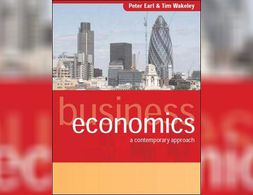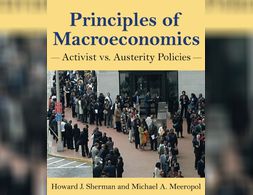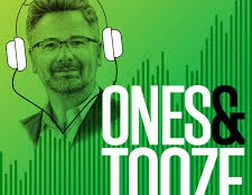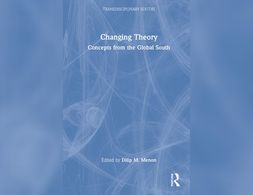✕
990 results
Photo by timJ on Unsplash Do you wish to know how to analyze and solve business and economic questions with data analysis tools Then Econometrics by Erasmus University Rotterdam is the right course for you as you learn how to translate data into models to make forecasts and to support …
Colonial Global Economy is a module of the Connected Sociologies Curriculum Project and examines the ongoing significance of colonial relations in the structure of the global economy It consists of 7 introductory lectures which range between 17 and 39 minutes of length In addition further readings resources and questions for …
Designed for both undergraduates and MBA students taking their first course in business economics, this text focuses on introducing students to economics as a framework for understanding business. It is structured around problems that decision-makers face, such as rejuvenating the firm in the face of declining demand.
Principles of Macroeconomics by Howard J. Sherman and Michael A. Meeropol differs from other texts in that this book stresses far more the inherent instability of the macro-economy.
In this lecture, Sanjay Reddy reviews the work of János Kornai, especially his critique of the socialist system, which is rooted in his understanding of the eminently political character of socialism.
Economics is extremely sick. It is so locked in its past that nearly all of its introductory textbooks are modelled on one that appeared in 1948. The discipline cannot continue in its autistic state much longer.
Capitalism is dissolving boundaries - not only in the sense of ever-expanding global trade flows, but also in the concrete everyday working lives of individuals. What implications does this have for our understanding of freedom, work and borders?
"Thought provoking and fresh - this book challenges how we think about economics.”
Gillian Tett, Financial Times
For further information about recent publicity events and media coverage for Rethinking Capitalism please visit http://marianamazzucato.com/rethinking-capitalism/
Western capitalism is in crisis.
Ever wondered why some countries are rich and others poor Or why some people believe hard work results in upward mobility and others don t To answer these questions you need to see the world sociologically In this introductory sociology course we will explore the concerns of an interconnected global …
In the late nineteenth and early twentieth centuries, Bombay was beset by crises such as famine and plague. Yet, rather than halting the flow of capital, these crises served to secure it. In colonial Bombay, capitalists and governors, Indian and British alike, used moments of crisis to justify interventions that delimited the city as a distinct object and progressively excluded laborers and migrants from it.
Reflecting his own concerns about the contribution economics could make to the betterment of society, Eli Ginzberg published this study of Smith's humanitarian views on commerce, industrialism, and labor. Written for his doctoral degree at Columbia University, and originally published as The House of Adam Smith, the book is divided into two parts.
In this article, Jihen Chandoul discusses the importance of food sovereignty in Africa, reflecting on the continent’s early post independence movements for self sufficiency.
The investigative research conducted by the German weekly newspaper "Die Zeit" and the British Daily Newspaper "The Guardian" includes a research-based critique of carbon trading.
All leaders are constrained by geography. Their choices are limited by mountains, rivers, seas and concrete. People and ideas are important; but if you don't know geography, you'll never have the full picture.
Western sanctions on Russia after its invasion of Ukraine quickly led the Ruble to lose more than 45 percent of its value. But these days, the Russian currency is back to its pre-war value. Cameron and Adam explain the turnaround and discuss what it means for the war.
Foundational economy is the most important concept you have never heard of. The foundational encompasses material utilities like water, gas and electricity and providential services like education, health and care. Taken together, these services matter economically and politically because they are the collectively consumed infrastructure of everyday life, the basis of civilization and should be citizen rights.
Why are some nations more prosperous than others? Why Nations Fail sets out to answer this question, with a compelling and elegantly argued new theory: that it is not down to climate, geography or culture, but because of institutions.
This book is an original, systematic, and radical attempt at decolonizing critical theory. Drawing on linguistic concepts from 16 languages from Asia, Africa, the Arab world, and South America, the essays in the volume explore the entailments of words while discussing their conceptual implications for the humanities and the social sciences everywhere.
The most influential and controversial economist of the twentieth century, John Maynard Keynes was the leading founder of modern macroeconomics, and was also an important historical figure as a critic of the Versailles Peace Treaty after World War I and an architect of the Bretton Woods international monetary system after World War II.
Ricardo Hausmann says the new industrial policy is an information revelation process about the state of possibilities, the nature of the obstacles and figuring out whether you can sort out the obstacles so that these new activities can take over.
In this roundtable conversation, Post-Colonialisms Today members, Omar Ghannam, Kareem Megahed and Tetteh Hormeku-Ajei, look to policies from early post-independence Africa to tackle issues exacerbated by the COVID- 19 pandemic.
The piece describes some of the effects that Nixon's decision to delink the dollar from gold in the 1970s had for the relationship between the IMF and its member states. A focus is on the negative effects of this change on societies in the Global South.
This is the second part of the seminar A Hard Currency of Politics The discussion centers on the The Currency of Politics by Stefan Eich and is hosted by the journal European Law Open Stefan Eich s presentation of his argument starts at minute 7 53 The discussion centers on …
This MOOC (Massive Open Online Course) discusses Global Workers’ Rights and shows instruments and strategies which can be used to implement them.
In Trouble in Paradise, Slavoj Žižek, one of our most famous, most combative philosophers, explains how by drawing on the ideas of communism, we can find a way out of the crisis of capitalism.
In this book, Blakely tells us a story of the class nature of capitalism, in which she centers the role of the financial sector and its rapid growth.
The course approaches migration as a constant phenomenon in human history and examines its main supporting theories It illustrates theories about people s individual decisions to migrate and also the factors of migration as a structural feature of our societies It explains the role social networks and institutions play in …
This article demonstrates Schumpeter s propagated approach to monetary analysis in macroeconomics so as to provide for a better understanding of the relation between finance and growth Peter Bofinger Lisa Geißendörfer Thomas Haas Fabian Mayer voxEU
Gender Development and Globalization is the leading primer on global feminist economics and development. Gender is a development issue because social considerations are not easily incorporated into institutions such as policies, regulations, markets and organizations. This process is often referred to as the mainstreaming of gender in development institutions.
To explain the pronounced instability of the world economy since the 1970s, the book offers an important and systematic theoretical examination of money and finance.
Thinking in Systems, is a concise and crucial book offering insight for problem solving on scales ranging from the personal to the global. Edited by the Sustainability Institute's Diana Wright, this essential primer brings systems thinking out of the realm of computers and equations and into the tangible world, showing readers how to develop the systems-thinking skills that thought leaders across the globe consider critical for 21st-century life.
This lecture offers a general and introductory overview of the theory of racial capitalism, focusing on the origins of racial capitalism and some of the debates it has generated.
We use cookies on our website. Click on Accept to help us to make Exploring Economics constantly better!





























